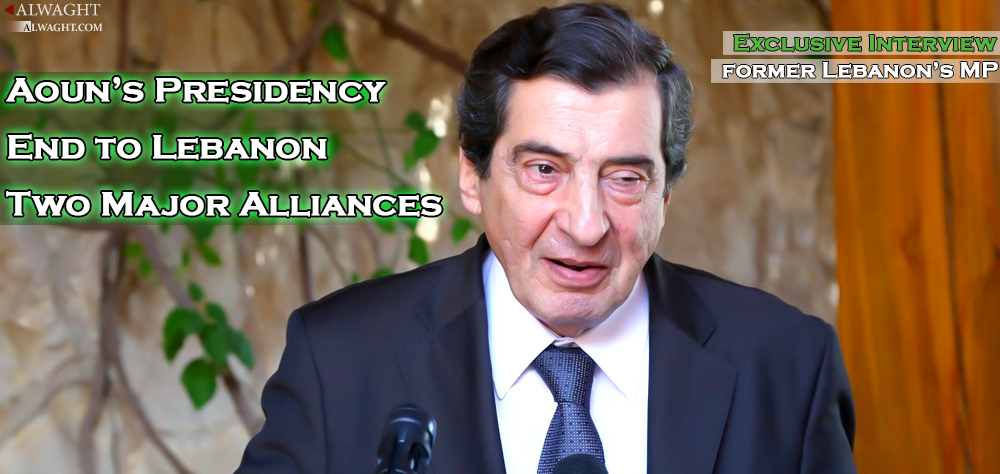Alwaght- Lebanon’s Saad Hariri's announcement of backing for the leader of Free Patriotic Movement Michel Aoun’s presidency of Lebanon has reshuffled the cards in the Lebanese politics. Following the move, the stances have changed, and while some parties backed Hariri’s announcement others have opposed the position of the leader of March 14 Alliance. However, the challenges remain standing ahead as the country’s parliament is scheduled to hold meeting on October 31 to choose president for the country.
Alwaght has talked to Ily al-Farzali, the former deputy speaker of Lebanon’s parliament, about an array of topics including the political stage of Lebanon, the anticipated parliamentary meeting to pick president, and also the latest speech made by Hezbollah’s Secretary General Sayyed Hassan Nasrallah on the country’s politics. The full text of the interview follows:
Alwaght: Following Hariri’s announcement of backing for Michel Aoun's presidency, is Aoun now more than ever close to taking the post later this month? Are there other possible scenarios?
Al-Farzali: There have been a lot of talks recently about possibility of existence of secret scenarios or games dubbed election games under the table to target Michel Aoun. But I think that these so-called scenarios are a product of the imagination and baseless because the key parties of the political stage are responsible for any possible outcomes of taking any steps that are in conflict with the past agreements and those that take the country to bad destinations, and nobody can bear their brunts. So, I believe that the October 31 parliamentary session will be a meeting for picking the new president Michael Aoun.
Alwaght: What do you think the opponents of Michel Aoun will do when he becomes president, especially those who once were his allies like the leader of Amal Movement Nabih Berri and the head of Marada Movement Suleiman Franjieh?
Al-Farzali: I think Nabih Berri's struggle is no longer with Michel Aoun, and Aoun is no longer his key opponent, rather, Berri’s key opponent now is Saad Hariri. Because Berri was clinging to the anti-Aoun stance of Hariri in a bid to manipulate the struggle to prevent Aoun from reaching the presidency. But now Aoun is out of circle of the rivalry. And I think what is left ahead of Berri is to accept the current situation and its results, regardless of his basic stance on Aoun or his public anti or pro-Aoun position.
Concerning the time after choosing Aoun a president for the country, I think that Berri will be present in the body of the upcoming cabinet and will take his share. He himself will be speaker of the parliament as long as Sayyed Hassan Nasrallah backs his candidacy for this post.
Alwaght: What are the most significant hurdles and big challenges the Lebanese people and Michael Aoun will face after Aoun becomes the president of the country?
Al-Farzali: The most important challenge is Lebanon’s restoration of the logic of the government, and starting to implement the Taif Agreement. So, the main reason for choosing Aoun as a president is to begin implementation of the Taif accord. Will it be implemented? This is the big challenge: either in terms of implementing the constitutional terms or writing new electoral law according to the constitution's text.
Alwaght: Two days ago we saw pictures of Nabih Berri and Suleiman Franjieh in Beirut's Tarik Al-Jadida district as well as in the sit-ins against Aoun’s taking the post of president despite the fact that they guarantee the national unity. Are what we are seeing in the Lebanese street and rise of new political camps and alliances best evidence signaling that the March 8 Alliance is collapsing after we witnessed collapse of opposing March 14 Alliance?
Al-Farzali: I think that these names no longer make any sense. March 14 Alliance ended some time earlier, and after Aoun becomes president there will be no reason for existence of March 8 Alliance. Concerning the Resistance, it is the backbone of the March 14 Alliance. The key forces that allied with the Resistance are still have their alliance standing. They still form a hosting environment for the Resistance either in its fight with the Israeli regime or the takfirists.
Alwaght: Concerning Sayyed Hassan Nasallah’s speech and the message he wanted to send to the supporters of Aoun-led Free Patriotic, what did he aim at?
Al-Farzali: I think Aoun’s supporters have come under a heavy media propaganda campaign since two years ago. They to date cast doubts on the final intentions of Hezbollah for its backing to Michael Aoun’s presidency bid despite Hezbollah’s frequent announcements of support for Aoun. This strong, coordinated, and preplanned campaign has managed to work on some minds and those of weak personality. So, Sayyed Nasallah through his speech addressed those people to reiterate Hezbollah’s loyalty to Aoun, which combined with Aoun’s resistance has led to his becoming a president.



























